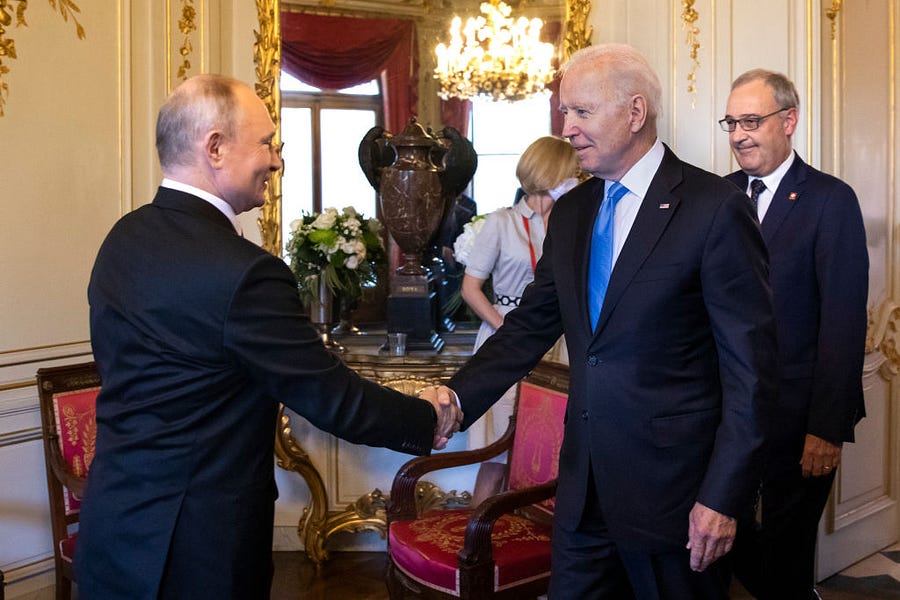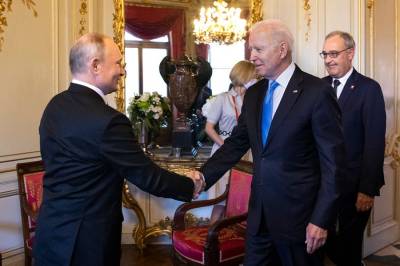“A nuclear war cannot be won and must not be fought.” That and a promise to “ensure predictability” by “a Strategic Stability Dialogue in the near future” were the only things that Joe Biden and Vladimir Putin agreed on strongly enough to put in writing—in a 140-word joint statement, which was the sole tangible yield of the duo’s June 16 summit in Geneva, Switzerland.
Nuclear missiles and bombs are again the sum total of the relations between Russia and the United States. We are back to the pre-Gorbachev era. The “this is not the Cold-War” mantra is wearing thin. It is time to admit: It is a Cold War.
True, the enemy of the democratic West is not communist totalitarianism fueled by Marxist millennialism. Yet the ideology of the Putin regime is hardly less toxic and perhaps more incendiary. The normative gap between the liberal democracies and the system that Putin assiduously forged is already almost as deep as during the Cold War.
Contrary to the prevailing view, Putin’s domestic regime is not merely a corrupt autocracy founded on propaganda, political manipulation, and repression. These descriptions amount to dangerous oversimplification because they vastly underestimate Putin’s ability to bend to his will millions of his compatriots.
Over the past two decades he has ceaselessly and systematically reshaped Russia’s national identity: the ways in which Russians see themselves, their country, and their history. He has rewritten, updated, or reawakened the elements of his country’s legitimizing myths—what he calls “spiritual bonds” (dukhovnye skrepy)—and deployed them in ways that proved deeply satisfying to tens of millions of followers.
Far more a Soviet patriot than a Russian one, Putin had sensed that which pro-democracy revolutionaries of the late 1980s and early 1990s tended to disregard: the deep-seated trauma inflicted on Russians by the loss of what they believed was their country’s exalted status. They grieved the disappearance of the mission by which the Soviet Union defined and measured its exclusivity: to be the counterweight, moral as well as military, to the United States. Putin adopted that mission as his own and placed it in the center of his foreign policy. In the eyes of his compatriots, Putin took on the post-imperial geopolitical “smallness” of post-Soviet Russia and made it disappear.
A diminutive hooligan from the slums of post-war Leningrad, Putin absorbed two other core components of the Soviet identity: equating respect with fear and self-assertion with aggression. Three months after the Crimea Anschluss in 2014, Lev Gudkov, a leading Russian political sociologist and the director of Russia’s sole remaining independent national polling firm Levada Center, found that people believed that Putin had “restored the West’s respect for Russia. The population very much appreciates this.” The polls also found that almost 9 in 10 Russians believed that their country was feared and 3 in 4 thought it a good thing.
Among the most effective and most ominous of the “spiritual fasteners” is the militarist triad: Russia’s glory is in her military victories, her greatness is synonymous with her military might, and her nuclear weapons are the foundation of the respect the world pays it. The Great Patriotic War, as the Russians call World War II, has been elevated to the most important event in Russia’s history; Stalin’s presiding over the war now outweighs his crimes; and the May 9 Victory Day remains the main official holiday. Not surprisingly, along with the secret police, the FSB, and the presidency, today the Russian army is the “most trusted” institution among the Russian people.
Along the way, Putin has recovered the defining elements of the Cold War and made them part of the national credo: The conflict between Putin’s Russia and the West is not about normal competition among large states and occasional frictions about specific issues. It is about an incompatibility of values. Just as the Soviet leadership did, the Kremlin today perceives the struggle with the U.S.-led “West” as ubiquitous and global, whether in Georgia, Syria, or Ukraine. This contest is permanent, and the West’s effort to undermine Russia is relentless.
Page after page is being borrowed from the Soviet propaganda playbook. Just as AIDS was “invented” by the CIA, COVID-19 was “genetically engineered” by the United States. Duma Speaker Vyacheslav Volodin said so two months ago at a parliamentary meeting attended by Putin.
More troubling still, the anti-West animus begins to surpass that displayed during the time of the Soviet Union. Even in the darkest days of the Cold War, neither Stalin nor his successors ever denied the Allies’ contribution to the victory. In the Victory Day speech last month, Putin said that the Soviet Union fought World War II “alone.”
In another instance of the heightened enmity, Russia claimed to have shot at the British HMS Defender and dropped bombs “in her path” because it allegedly was in Russia’s territorial waters in the Black Sea. The British Ministry of Defense has denied the shooting and the bombing. But no matter: In Russia’s most popular prime-time talk show, Vesti Nedeli, Dmitri Kisilev (who is also the head of Sputnik, the main Russian state foreign broadcast service) told his audience that, egged on by the U.S., Britain was out to provoke a war. Next time, he warned, “we will sink any British ship that would want to repeat the provocation.” Two days later, in an annual “Direct Line” press conference watched by millions of Russians, Putin recast the episode in unmistakably existential terms: “We are fighting for ourselves, for our future.”
Exceeding Soviet propaganda in stridency is a sign of a disturbing difference between the two Cold War regimes. The Soviet system rested on the unshakable belief in the “science” of Marxist historical materialism, the confidence in the distant but inevitable victory of the “superior social organization” of socialism over the “rotting imperialism.” Just as importantly, the World War II victors and the engineers of the nuclear superpowership parity with America, the Politburo elders had little to prove and could rest on their laurels. Having known firsthand the horrors of war, they were wary of provoking a direct confrontation with the West. Lish by ne bylo voyny—anything but a war—was their refrain.
By contrast, since 2014, when Putin recast himself as a wartime president, a war or threat of war has been the key to his regime’s legitimacy. What my Russian colleagues called “militarized patriotism in peacetime” became the leitmotif of the Kremlin propaganda orchestra.
The tiger that Putin saddled must be fed fresh meat periodically. A second Cold War could turn out to be more volatile and flammable than the original edition.
Leon Aron is the author of a biography of Boris Yeltsin, among other books, and a senior fellow at the American Enterprise Institute.






Please note that we at The Dispatch hold ourselves, our work, and our commenters to a higher standard than other places on the internet. We welcome comments that foster genuine debate or discussion—including comments critical of us or our work—but responses that include ad hominem attacks on fellow Dispatch members or are intended to stoke fear and anger may be moderated.
With your membership, you only have the ability to comment on The Morning Dispatch articles. Consider upgrading to join the conversation everywhere.